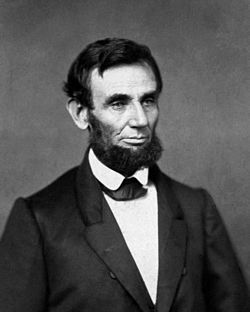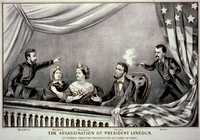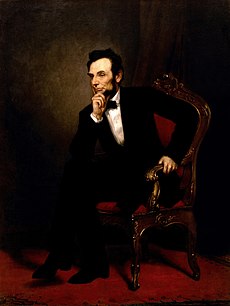President Abraham Lincoln 
 Abraham Lincoln (February 12, 1809 – April 15, 1865) was the 16th President of the United States. He served as president from 1861 to 1865, during the American Civil War. Just six days after most of the Confederate forces had surrendered, and the war was ending, John Wilkes Booth assassinated Lincoln. Lincoln has been remembered as the “Great Emancipator,” because he worked to end slavery in the United States. Lincoln was the first President of the United States to be assassinated.
Abraham Lincoln (February 12, 1809 – April 15, 1865) was the 16th President of the United States. He served as president from 1861 to 1865, during the American Civil War. Just six days after most of the Confederate forces had surrendered, and the war was ending, John Wilkes Booth assassinated Lincoln. Lincoln has been remembered as the “Great Emancipator,” because he worked to end slavery in the United States. Lincoln was the first President of the United States to be assassinated. 
Life 
Abraham Lincoln was born on February 12, 1809, in Hodgenville, Kentucky. His parents were Thomas Lincoln, a farmer, and Nancy Hanks. His family was very poor. Abraham had one brother and one sister. His brother died in childhood. They grew up in a small log cabin house, with just one room inside of it. 
Although slavery was legal in Kentucky at that time, Lincoln’s father, who was a religious Baptist, refused to own any slaves. When Lincoln was seven years old, his family moved to Indiana, and later, to Illinois. In his childhood, he helped his father on the farm, but when he was 22 years old, he left home and moved to New Salem, Illinois, where he worked in a general store. 
Later, he said that he had gone to school for just one year, but that was enough time to learn how to read, to write, and to do simple math. In 1842, he married Mary Todd Lincoln. They had four children, but three of them died when they were very young. 
Abraham Lincoln was sometimes called Abe Lincoln, or “Honest Abe,” after he ran miles to give a customer the right amount of change. The nickname “Honest Abe” came from a time when he ran a business that had failed. Instead of running away like many people would have, he stayed, and he worked, to pay off his debt. 
He has also been called the “Great Emancipator,” because of his work to end slavery in the United States. In 1863, he declared that all slaves held in the rebellious Confederate States were free. He also sponsored the Thirteenth Amendment to the United States Constitution. Ratified in 1865, nine months after his assassination, that amendment completely outlawed slavery in the United States. 
1. Lincoln was president during:
a) World War I
b) the Civil War
c) the Revolutionary War
2. Lincoln has been called:
a) the best president
b) the Champion of Abolition
c) the Great Emancipator
3. Lincoln was born in:
a) Kentucky
b) Washington D.C.
c) Illinois
4. How much education did Lincoln have?
a) a high school degree
b) a college degree
c) very little schooling
5. One of the things he is best known for is:
a) encouraging more slavery
b) ending slavery
c) being nice to his slaves
Early political career 
Lincoln started his political career in 1832, when he ran for the Illinois General Assembly, but he lost that election. He then served as a captain in the army during the Black Hawk War, a war with Native American tribes. When he moved to Springfield, Illinois in 1837, he began to work as a lawyer. Soon, he became one of the most highly respected lawyers in Illinois. 
In 1837, as a member of the Illinois General Assembly, Lincoln issued a written protest about its passage of a resolution stating that slavery could not be abolished in Washington, D.C. In 1841, he won a court case (Bailey v. Cromwell), representing a black woman who claimed that she had already been freed, and thus could not be sold as a slave. In 1847, he lost a case (Matson v. Rutherford) representing a slave owner (Robert Matson), claiming return of fugitive slaves. 
In 1846, Lincoln joined the Whig Party, and he was elected to one term in the House of Representatives. After that, he ignored his political career, and instead, he became a very successful railroad lawyer. But in 1854, in reaction to the passage of the Kansas-Nebraska Act, Lincoln became involved in politics again. He joined the Republican Party, which had recently been formed in opposition to the expansion of slavery. 
In 1858, he wanted to become a U.S. Senator. Although he was not elected, the debates that he was part of drew positive national attention to him. The Republican Party nominated him for the Presidential election of 1860. 
6. Before Lincoln became president he:
a) was a lawyer
b) was a slave owner
c) was the mayor
7. He was nominated for the Presidential election of 1860 because:
a) he was already a good politician
b) no one knew who he was
c) he got national attention because of his Debates
Presidency 
Lincoln was chosen as a candidate for the election of 1860 for different reasons. Among these reasons were that his views on slavery were less extreme than those of other people who wanted to be elected. Lincoln was from what was then one of the Western states, and he had a better chance of winning the election because of the voters there. 
Other candidates, who were older or more experienced than he was, had enemies inside the party. Further, Lincoln’s family was poor, which added to the Republican position that supported free labor, the opposite of slave labor. 
Lincoln won the presidential election in 1860, and he became the 16th President of the United States. He won, despite the fact that he had very few votes from the South. For the first time, a president had won the election because of the large support he got from the states in the North. 
During his presidency, Lincoln’s appearance became well-known because of his large stovepipe hat. He used his tall hat to store papers and documents when he was traveling. 
8. Lincoln’s election to president was unusual because:
a) very few people voted for him
b) he got a lot of support from the North instead of the South
c) everyone voted for him
9. What did Lincoln use his tall stovepipe hat for:
a) keeping his head warm
b) making himself look taller
c) storing papers and documents while traveling
Lincoln and the Civil War 


Later, four more states (Arkansas, Virginia, Tennessee, and North Carolina) joined the Confederacy, for a total of eleven states that had seceded. In his entire period as president, Lincoln had to rebuild the Union with military force, and with many bloody battles.

He also had to stop the “border states,” like Kentucky, Missouri, and Maryland, from leaving the Union and joining the Confederacy. Lincoln was not a general, and he had only been in the army for a short time, during the Black Hawk War. However, he still took a major role in the war effort, often spending days and days at the War Department, contributing to strategies to defeat the South.

His plan was to cut off the South by surrounding it with ships, to control the Mississippi River, and to take Richmond, which was the Confederate Capital. He often clashed with generals in the field, especially George B. McClellan, and he fired generals who lost battles, or who were not aggressive enough. Eventually, he made Ulysses S. Grant (who would later become a U.S. President) the top general in the army. Grant would be the Union general who finally won the war for the North.

10. How many states seceded (left the union)?
a) 7
b) 4
c) 11
11. Lincoln’s plans for forcing the South to surrender included:
a) surrounding it with ships
b) allowing them to keep their slaves
c) blowing up all the cities with dynamite
Emancipation Proclamation 
With the Emancipation Proclamation, put in force on January 1, 1863, Lincoln ordered freedom for all slaves in those states still in rebellion during the American Civil War. It did not immediately free all of those slaves, however, since those areas were still controlled by the rebelling states of the Confederacy. 
Only a small number of slaves, already behind Union lines, were immediately freed. As the Union army gradually advanced, nearly all four million slaves were effectively freed. Some former slaves even joined the Union army. The Proclamation also did not free slaves in the slave states that had remained loyal to the Union. 
Neither did it apply to areas where Union forces had already regained control. Until the Thirteenth Amendment to the U.S. Constitution, in 1865, only the States had power to end slavery within their own borders, so Lincoln issued the proclamation as a war measure. 
The Proclamation made freeing the slaves a Union goal for the war, and it put an end to movements in European nations (especially in Great Britain and France) that would have recognized the Confederacy as an independent nation. Lincoln then sponsored a constitutional amendment that would free all slaves. The Thirteenth Amendment, making slavery illegal everywhere in the United States, was passed late in 1865, eight months after Lincoln was assassinated. 
12. The Emancipation Proclamation:
a) ordered that the Civil War ended
b) ordered that all Southerners would be put in jail
c) ordered freedom for all slaves
13. When the Emancipation Proclamation was announced:
a) all slaves were freed immediately
b) slave in states that had remained loyal to the union were not freed
c) most people ignored it
14. Eventually, it took the Thirteenth Amendment to:
a) stop the fighting
b) make slavery legal again
c) make slavery illegal everywhere in the United States
Gettysburg Address 
Lincoln made a famous speech, after the Battle of Gettysburg in 1863, called the Gettysburg Address. This battle, which the Union won, was very important, but many soldiers from both sides died. The speech was given when they built the cemetery for the dead soldiers. It is one of the most famous speeches in American history. 
15. Lincoln gave a speech called the Gettysburg Address:
a) after the Battle of Appomattox
b) so people would know where he lived
c) after the Battle of Gettysburg
Second term and assassination 
Lincoln was reelected President of the United States in 1864, and he was re-inaugurated on March 4, 1865. Soon afterwards, it appeared likely that the Union would win the Civil War. Lincoln proposed lenient terms for restoring self-government in the states that had rebelled. On April 9, 1865, the leading Confederate general, Robert E. Lee, surrendered his armies. 
On April 14th, Lincoln went to attend a play with his wife at Ford’s Theatre in Washington, D.C. During the third act of the play, John Wilkes Booth, a well-known actor, and a Confederate spy from Maryland, entered the presidential box and fired a pistol, at point-blank range, into the back of Lincoln’s head, mortally wounding him. 
An unconscious Lincoln was carried across the street to Petersen House. He was placed diagonally on the bed, because his tall frame would not fit normally on the smaller bed. He remained in a coma for nine hours, before he died the next morning. Lincoln’s secretary, John Hay, was present when Lincoln died. He saw, “a look of unspeakable peace come upon his worn features.” Booth escaped, but he soon died from shots fired during his capture on April 26. Abraham Lincoln was the first American president to be assassinated. 
16. After his first term as president, Lincoln:
a) won a second term
b) retired from politics
c) decided to go back to being a lawyer
17. Lincoln was killed:
a) soon after the end of the Civil War
b) before the Civil War started
c) at the end of his 2nd term as president.
18. The person who shot Lincoln was:
a) General Grant
b) John Wilkes Booth
c) his wife
Legacy 
























